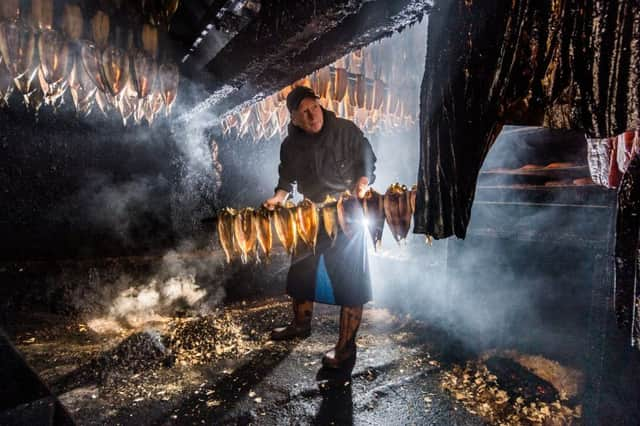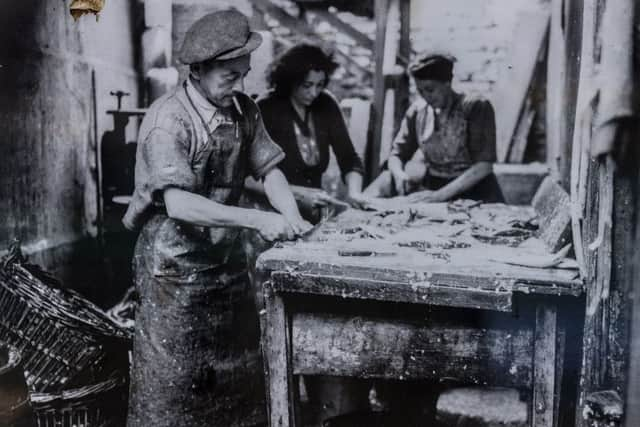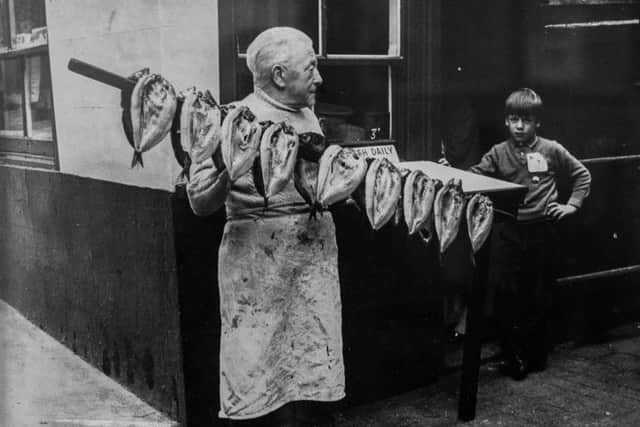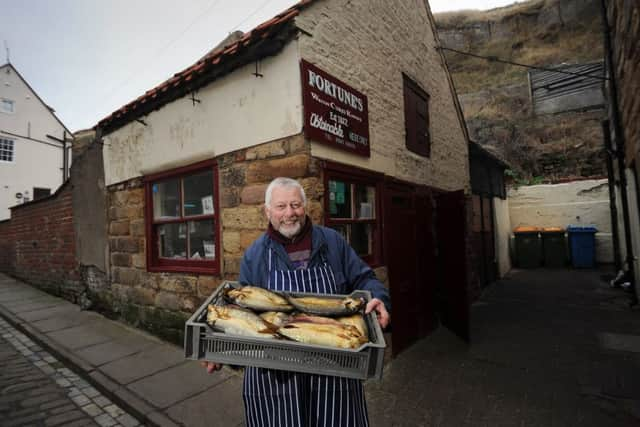We visited Whitby’s last traditional kipper smokehouse


Today, though, it’s a different kettle of fish. The leaden skies mirror the grey, frothing seas and if I was writing a puff piece about the town I might describe the wind as “bracing” (though bitter would be more apt).
It’s a midweek morning in the middle of winter and there’s barely a soul about – even the pesky gulls are conspicuous by their absence (though more of them later).
Advertisement
Hide AdAdvertisement
Hide AdWhitby is famous for many things including its abbey, its links to Bram Stoker’s Gothic novel Dracula and, of course, fish and chips. And there’s another little piece of heritage tucked away towards the top of Henrietta Street which sits in the shadow of St Mary’s Church.


It was here way back in 1872, that William Fortune set up Fortune’s Kippers. At the time, Queen Victoria was just over halfway through her reign, William Gladstone was Prime Minister and it would be another 25 years before Dracula was published.
The family business was a classic seaside mixture of kippers and donkeys. These days they’ve the dropped the donkeys but they’re still smoking kippers. And when it comes to old-fashioned, traditional smokehouses, Fortune’s Kippers is the proverbial last man standing.
Today, Barry Brown and his brother Derek are the fifth generation of the Fortune dynasty to run the family business and, as Barry points out, they’re still smoking kippers the same way his great, great grandfather did. “The methods haven’t changed since those days. The smoking process takes about 20 to 24 hours, but it’s not an exact science. We use a mixture softwood shavings first as a bed and then oak shavings and oak and beech sawdust on top of that.”
Advertisement
Hide AdAdvertisement
Hide AdEach day they follow the same process. “When we arrive one of us will start processing the herring which involves splitting and brining them and then hanging them in the smokehouse, while the other one starts emptying the smokehouse and stocking the shop so we’re ready at nine o’clock when customers start arriving.”


Today, it’s been a quiet start but it’s not always so calm. “It can get busy, especially in the summer,” says Barry. “Some days they’ll be queuing out the door and down the street.”
They sell the kippers in pairs and on a really busy day they might sell as many as 400 of them. “You can never tell how busy you’re going to get or what orders are going to come in, so if we’ve sold out by half past one then we’ll shut up shop.”
They get fish coming in most days. “It’s all frozen at sea these days and it has been since the mid-70s.” This, he says, dates back to when the UK joined the European Common Market and North Sea fishing bans were imposed. “That’s when the Icelandic and Norwegian herring came on the scene.”
Advertisement
Hide AdAdvertisement
Hide AdThis is where things differ from the days when his ancestors were running the show. “I can just phone our supplier up and tell him how much fish I want and it’ll be on my doorstep by ten o’clock the next morning.”


The Norwegian herring is “fantastic”, says Barry. They also sell smoked salmon and smoked haddock and they do a mean kipper pate. But most people come here for the kippers,
Some are also drawn here out of curiosity in the hope of getting a peek inside the smokehouse. For it’s here where the real alchemy takes place. From the outside it looks like a glorified shed but inside the blackened walls are covered with a tar made from the steam, the fires and the oils that drip from the fish.
It’s an evocative sight and for Barry and Derek it’s wrapped up in their childhood. “We both helped out our grandad when we were children and then we used to help out our uncle at weekends. It was pocket money for us when we were younger,” says Barry. “I was here as a toddler and I only know that because I’ve seen the photographs,” he adds, chuckling.
Advertisement
Hide AdAdvertisement
Hide AdIn the early days when the business first started, William Fortune’s son Martin worked with his father in the smokehouse while also running the donkey rides on the beach. Martin married Ellen who helped him pack kippers into wooden boxes that were sent by train across the country.
“We grew up with tales about our great granddad. They had a mule called Elmo the Mighty and he used to wander into the kitchen,” says Barry. “It’s always been a magnet for me this place and it’s great because you meet so many different people.
“The heyday was when the pits were open. The miners used to be regular visitors. They’d come in big groups and go out fishing and they’d take some kippers back home with them.”
These days business is still ticking along nicely. “We have regular customers and we get a lot of people who pop in for the first time and then keep coming back. We get people making a beeline for us when they visit Whitby.”
Advertisement
Hide AdAdvertisement
Hide AdSo too, it seems, do the gulls and Barry has to wave one away as it toddles towards the smokehouse. “They never used to come near us but for some reason they’ve started to in the last couple of years. They’ll even walk into shops.”
He blames people feeding them fish and chips for emboldening them, which is backed up by local reports of brazen gulls swooping down and plucking ice creams and hotdogs out of people’s hands.
Henrietta Street with its quaint cottages and cobbled road oozes nostalgia, though the audacity of the local gull population isn’t the only thing that’s changed here. “It used to be full of characters thirty or forty years ago. Now there’s a lot more holiday lets, but it’s just how things are I suppose.”
Appetite for their kippers, though, shows no sign of waning and has been boosted over the years by visits from some of the nation’s best known chefs. “We had Rick Stein a long time ago and Gary Rhodes in his early days. James Martin’s a big fan of Whitby and he’s been up here, too.”
Advertisement
Hide AdAdvertisement
Hide AdPeople come from far and wide to visit Fortune’s. “We’ve had people from Australia and New Zealand, they like to come in and have their photo taken.”
One of the reasons they’ve gained a global following goes back to the The Two Fat Ladies. They filmed at Fortune’s and the programme was later shown Down Under and in North America. And right on cue a family from the US wanders in to have a look around.
The shop is open every day but closes by 3pm. “We don’t have to clock in and out and in the summer we might start a bit earlier and finish a bit earlier,” says Barry.
He enjoys it but there’s a sense of responsibility, too, in keeping the family business going, though both he (Barry worked in the steel industry) and Derek (who used to work for British Rail) didn’t come into it until later on.
Advertisement
Hide AdAdvertisement
Hide Ad“It’s quite a tiring job but you need to really want to do this sort of thing. My granddad used to live across the road and he worked here until he died.”
Barry’s now 62 and his brother is 60 and they have one eye on the future. His daughter Beth helps out as does Derek’s son Matthew so the hope is it will continue for years to come. “Would it all work without me and Derek? I don’t know. But we’ve worked together for the past 25 years.” And they get on ok? “Yes... you’ve got no choice when you work together,” he says with a wry smile.